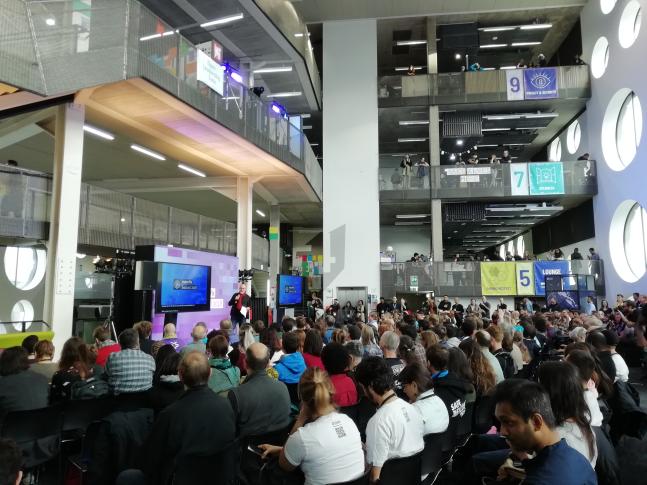
The Mozilla Festival (MozFest) 2018 wrapped up over the last weekend in October with the MozFest Weekend, showcasing world-changing ideas and technology through workshops, talks, art, games, debates and interactive sessions. Hundreds of activists and makers were brought together with the aim of building a stronger community. As a contributor to Mozilla’s open source project Common Voice and a participant in Mozilla’s meetups in Berlin, I was particularly excited to experience the festival and connect with various organisations and feminist initiatives.
This year the main theme was “Your Data and You", to explore how we as users can take control of our data, our online lives and our collective future through more than 300 sessions grouped around specific themes: Decentralisation, Digital Inclusion, Openness, Privacy and Security, Web Literacy, Youth Zone, Art+Data and Queering MozFest. I found the main theme particularly relevant as the terms and conditions of web services we use are forcing us to accept corporate surveillance and storage of the gathered information for an indefinite time, so even if we delete what we shared, the data is still archived in their data centres.
In addition to talks and panels touching on hot topics, MozFest featured a wide variety of participatory workshops which gave participants an opportunity to engage and think about the issues presented more deeply and find viable solutions that could be implemented in the future. For example, the session Design for Renaming exposed the struggle that trans people experience while changing their name (and gender marker) on websites and online services. When a person gets married or divorced, the name change is usually quite straightforward and easy, as it fits cultural norms; however, for trans people, it can be a nightmare and long-term effort during which they still get addressed by their dead name.
Some other highlights from MozFest that I found particularly enriching and that I want to follow up on:
-
"Proxy: Using Board Games to Educate Young People About Privacy and Security Measures": Azza El Masri from APC member organisation Social Media Exchange (SMEX) beta tested Proxy, a board game developed to teach Lebanese youth about online mobile privacy and security. In the game a "hacker" and a team of three "activists", each with a unique identity and skill set, compete against each other and as a result educate themselves about privacy and security issues.
-
The Feminist Principles of the Internet inspired two Brazilian feminists to start the project Cl4ndestina, which enables website hosting on a feminist server. A feminist server is a server that supports feminism, is focused on privacy and uses open source software.
MozFest was a great experience, an opportunity to explore issues I was not even aware of (like forbidden web hosting of information about abortion in Brazil) and also a celebration of creative ideas with art. It was inspiring as it featured leading voices of activists, engineers and open source enthusiasts who are aware of the need to keep the web open, safe, inclusive and accessible for all people around the world.
Videos of all recorded talks from MozFest 2018 are available on YouTube.
Image: The MozFest Weekend welcome at Ravensbourne University, London. By Maja Kraljic.